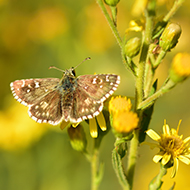Government announces nature recovery projects

One species that may benefit from the West Midlands project is the dingy skipper butterfly.
Defra and Natural England have announced that five nature recovery projects will be set up across England to create and restore wildlife-rich habitats.
The projects will be set up in the West Midlands, Cambridgeshire, the Peak District, Norfolk and Somerset, and will help wildlife populations to move and repopulate.
An ambitious project, the five planned areas will be equivalent in size to all 219 current National Nature Reserves.
Rebecca Pow, environment minister, said: “These five projects across England are superb examples of exciting, large-scale restoration that is critically needed to bring about a step change in the recovery of nature in this country.
“They will significantly contribute to achieving our target to halt the decline in species abundance by 2030 and our commitment to protect 30% of our land by 2030, enabling us to leave the environment in a better state than we found it.”
The project areas are Purple Horizons in the West Midlands, Cambridge Nature Network, Cambridgeshire, Wye Valley in the Peak District, Somerset Wetlands in Somerset and Wendling Beck in Norfolk.
Director of policy at The Wildlife Trusts, Joan Edwards, commented: “It’s good to see positive ambition from Government to help people access nature close to where they live, as well as efforts to connect existing strongholds for wildlife.
“Species desperately need green corridors to bridge together fragmented habitats in addition to big, bold projects that enable landscapes to recover at scale.
“Wildlife has suffered catastrophic declines in recent decades and 15% of species in the UK are at risk of extinction.
“Government can help turn that around by accelerating the creation of a nature recovery network, dedicating more land for nature, and applying stronger protections for our most important sites.”



 The Animal and Plant Health Agency (APHA) has updated its online reporting service for dead wild birds.
The Animal and Plant Health Agency (APHA) has updated its online reporting service for dead wild birds.